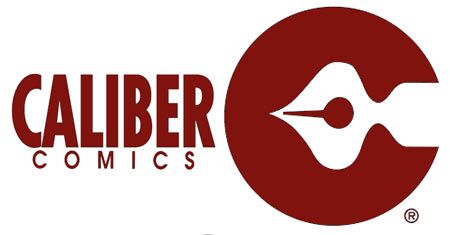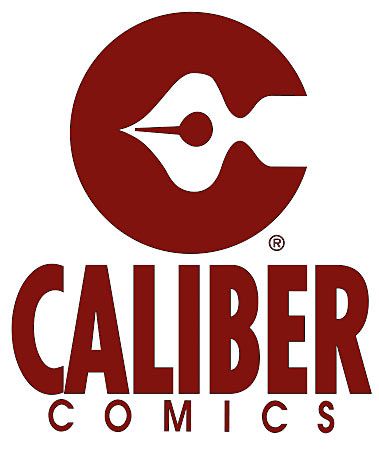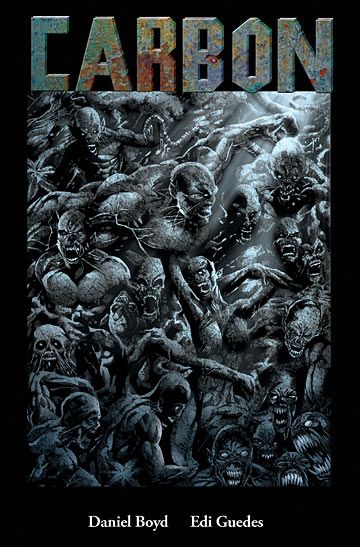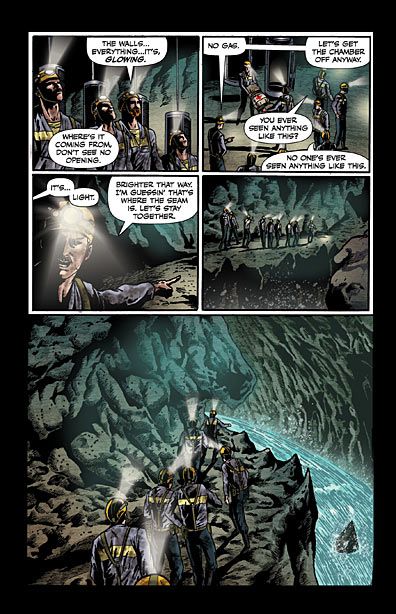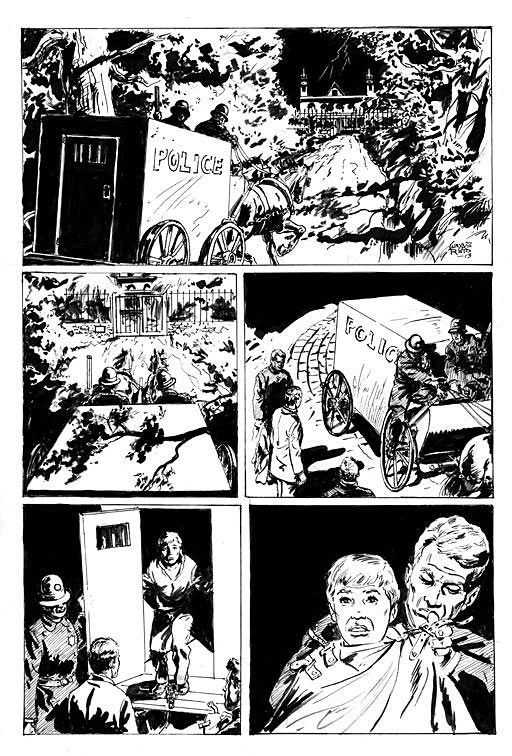Gary Reed launched Caliber Comics in 1989 and during the 1990s became one of the most important publishers in North America. A quick glance at the many creators whose work they published -- including Brian Michael Bendis, Guy Davis, Mike Allred and more -- show the broad range of styles, approaches and genres the company published. The company shuttered in 2001, but founder Gary Reed last month announced that he is reviving the indie comic book company.
Since Caliber closed, Reed has remained busy in publishing and has continued to write "Deadworld," published in recent years by IDW. Reed spoke with CBR News about the company's revival, why now is the right time and offers a look at their first two books.
CBR News: First off, for younger readers or those with short memories, what was Caliber?
Gary Reed: Caliber was a company that I started up in 1989, I believe, and the reason I have a hard time remembering is that it was an odd case as we picked up "Deadworld" and "Realm" from Arrow Comics who went defunct but one of the books was already at the printer for "Deadworld" and "Realm" had an issue come out from another publisher between Arrow and Caliber. So, I count 1989 as the real start as that's when we started releasing books on a regular schedule. Granted, it was January so all the prep work was prior to that. The premise of the company was simple. Everything was creator-owned and all Caliber did was publish it. We split royalties with the creators getting 60% and Caliber 40%. The creators didn't have to pay a fee or anything. It's very similar to how Image [Comics] is set up now in that creators own everything but Image assesses a fee -- I think it's still around $2,500, but the creator gets the royalties after all costs and fees are covered. It's a bit different with graphic novels because you have to consider returns.
That was the basic setup. Caliber certainly wasn't the first to offer creator-owned as it existed for years and other companies were doing it the same time. Nowadays, most creator-owned publishers stipulate that ancillary and exploitative rights are tied into the properties but back then, it wasn't nearly as much a concern.
I think the initial reaction to Caliber was so great because we had some great creators doing some unique work. We really weren't easy to lump into any kind of genre as we had "The Crow," "Baker Street," "Deadworld," "Realm," and then the anthology title, "Caliber Presents." Early on we also picked up some Canadian titles in "Northguard" and "Mackenzie Queen" and after the first year some other titles. I think some of the appeal that Caliber had was a sense of community with the creators. They'd work on each other's books, they contribute jointly to stories in the anthologies and we'd usually all travel to the conventions together. Usually if you saw one Caliber guy, there were others lurking somewhere.
Of course, after the first year, things revved up quite a bit with quite a few titles coming out and, eventually, we ended up publishing and/or introducing a lot of today's top talents.
You recently announced that Caliber will return. Why is this the time to bring Caliber back? What was your thinking?
I really never expected to bring it back, or I should say, I wasn't planning on it. I did always keep it in the back of my mind as I've had a few inquires from people wanting to buy the rights, which essentially was only the name, and there were a few business propositions that discussed bringing it back. Although nothing was really enticing enough, I did realize I was reluctant to definitely turn it over. In the last year or so, there was another situation that looked more promising. I realized I had to cement exactly what Caliber was in terms of not only the publishing history but what does Caliber represent now? I had my own creations, of course, and even though they were published later by mainly Image and IDW, I could align them with Caliber. I had quite a few creators who entrusted me with their properties and of course, I had Transfuzion. Transfuzion was a company I started up with Rafael Nieves about six years ago and the intent was primarily just to have a publishing house for our material. It grew substantially from that and now it will end and just roll into Caliber. So, I had all these titles and was involved in some publishing, some agency in terms of rights for foreign printing, licensing, and digital. Even though there was Transfuzion, many of the interested parties felt the legacy of Caliber was important to the whole equation, so it just seemed like I had to bring in everything under one entity and Caliber made the most sense. By this time, I knew the big deal was not likely to happen but it just felt right to turn back to Caliber. It seemed a bit awkward trying to brand two different entities when they were the same thing. That all coincided with discussions I was having with Eric Reichert of Eagle One Media who's in my area and we discussed joining together to bring everything under the single name of Caliber. It just seemed like everything aligned at that time.
The Original Walking Dead Return in Gary Reed's "Deadworld: Restoration"
Where do things stand with Transfuzion?
Transfuzion will just end. That will just cause confusion. But just like Transfusion, Caliber is primarily a publisher. Yes, we'll listen to other opportunities but if nothing happens in those areas, it's not going to disrupt the plans.
"Deadworld" has been coming out from IDW. Do you plan to continue working with IDW or bring the series back to Caliber?
IDW has been great to work with and that decision will primarily be up to them. Caliber has no plans at this time to do monthly comics; it's just not something I think we can make a big enough impact on. I mean, look at the companies out there who have been doing it for a while and many of them are struggling. I get that for the most part, the comics market is not hurting for new titles, there's plenty of them coming out every month. Even if we were to debut some incredible, mind-blowing titles that could change the industry, you still have to sell the fanbase and retailers on it just to have it seen. There's budget constraints throughout the market and unfortunately, the market strategy relies on gaining sales at the expense of existing titles as there isn't really any growth in the direct market. I don't want to devote my attention to fighting for a small piece of the shrinking pie.
Obviously, that begs the question of why even bother? But I think there's a substantial difference in providing graphic novels and books as opposed to the floppy market. I've seen it with Transfuzion and even Caliber's previous run, that there can be growth outside the traditional comics market. I'm not saying it's a wide open virgin market, but there are more in-roads there. Of course, this is even more apparent with digital. Although the digital market hasn't been the panacea that people hoped for, it still has quite a bit of opportunity. The traditional comics market is still tied in closely with superheroes and I don't see that changing any time soon. Sure, there's lot of exceptions but you can't build a plan around exceptions.
So, getting back to the question about IDW, If they're up for it and I want to do "Deadworld" comics, then yes, the best situation will be to go through them. I'd be happy to do so.
Obviously plans change, but what's your vision for Caliber over the next couple years?
I think it's really important to have a plan yet not being locked into it. We can just look at how much things have changed in recent years so both Eric and I understand that whatever the plans are right now, they're likely to change and you have to be adaptable. But for right now, we plan to get all the titles we have under Caliber into print and digital. Even though Transfuzion released over 70 titles, there are still another 20-25 that have to be put into production. Almost all of these are collections of previously published material so it's essentially building up the library but there are a few new titles that we're involved with. I think having a backlist of titles in print and digital is very important but you can't structure a thriving publishing house on just that. But at the same time, you should have it in print. I've been horribly neglectful of a few titles that have demand, such as "The Realm," that need to be out there for the fans that want them. Who knows, it might lead to a new series, and that's something that we can gauge better once the collections are out there.
We will likely be doing some novels and obviously, many of those will tie into our existing titles as we're not planning to become a major book publishing house. Again, that's a whole different dynamic but we see the novels as a complement to the graphic novels not a separate division. As I said, there's some new books we'll be launching and we will likely go to Kickstarter or other crowd funding platforms for some. The only plan we really have is to proceed ahead and keep an open mind about potential avenues. I know it violates Business Plan 101 but it does more or less follow that structure -- we just have a lot of asterisks plastered around the plan.
2014 is a very different world from 1989, when you originally launched Caliber, and a different world from when the company ended. From your perspective, what do you see as the biggest change that's happened?
Yes, it sure is, but I'm approaching Caliber the same way. Creator-owned and guaranteed that it will be published. And of course, digital, which we didn't have back then. I cannot guarantee that the comics market will support it. In the past, I knew the distributors would carry it but we had no control if retailers would order it. That's one of the biggest differences now -- you just have one distributor. I have no problems with Diamond. They didn't carry all the Transfuzion line but I felt the discussions we had were always fair and you got to admit, the reliability of Diamond honoring purchase orders and timely payments is something they don't get enough credit for. Yes, it's their job but you'd be surprised how many big companies don't do their jobs.
I think one of the biggest differences is that I can't guarantee someone's book will be carried by the distributors and officially offered to stores. In the past, that was a given. Of course, it didn't mean the stores would order it. However, in the past, before the advent of Capital's Advance Comics and then Diamond Previews becoming an ordering tool, there were relationships built up with retailers. Now, many of them only order the non-exclusives based on consumer demand. While publishers obviously don't like that, I used to own four comic shops. I tell you, I'd rely on that quite a bit if I still had them. I don't think enough fans understand that inventory is red on the balance sheet. You can't afford to guess wrong, especially in today's market. Yes, I wish it were different and that stores and more of a margin where they could take risks, but I think most of them are just hanging on and know how fast the market can change.
In the past, Caliber had more value for newcomers. Today, since we are only operating on royalties, some will not bother with us. After all, they can do it themselves. I get that. And I say that if you're a creator that is not going to sign up with a company that isn't going to give you page rates or guarantees because you could do it yourself-by all means, do it. I'm a huge proponent of self publishing and directed a lot of people, especially who submitted to Transfuzion, to do so. You don't need me or any other publisher who isn't going to guarantee you a paycheck. Some people don't want to do that, so that's who Caliber and other companies are there for.
Lastly, I think another big difference in comparing then and now perception of what is publishable. Since our primary foundation is creator-owned, that doesn't mean something should be published just because it's creator-owned. It still has to have an aspect of quality and that is really tough because that is so subjective. What it's going to come down to is what I like, or something that is not the same as we're already doing, or something that shows you've moved on from the training stages, and frankly, I don't know exactly what the criteria is. I know it when I see it. Yeah, it's frustrating as hell but I don't know anyway around it. Even though we're not laying out the cash, we still can't publish everything -- nor do we want to.
Given all those changes, what do you think is the biggest opportunity, both from the perspective of a creator and a publisher?
I think if you asked a publisher this question five years ago, it would have a totally different answer than now and I think that shows how fast things change. As a creator, I like today's work of connectivity in that something I create is going to get out there in some format moreso than before and I can get feedback on it. Before, an issue would go out and you might get a couple of letters and you find out what people thought. Now when an issue comes out, I'm contacted by scores of people engaging about the story and asking questions.
As a publisher, the opportunities are sort of the same but of course, there are quite a few restrictions. There's no denying the comics market has shrunk but there are other opportunities that didn't exist before. There's much more access to foreign markets, to the traditional non-comic reader, and of course, the digital platforms open up a lot of different areas.
I think instinctively that both Eric and I felt a relaunch of Caliber would put us in position to take advantage of what may come yet at the same time, publish books. I think you can see that I'm pretty good at hedging bets because I don't like hyperbole and I don't ever want to make promises I can't keep.
Are there any specific books that you can announce at this stage?
Well, we do have some stuff in the works but I'm always reluctant to announce things way far ahead because people start asking and by the time it is actually on the schedule, some fans already have a feeling it's late since it was announced so long ago.We're concentrating on a lot of collections of previously published material at first but we do have some new books.We have "Carbon" coming from Danny Boyd, who did the "Chillers" movie and graphic novels. It's an environmentally themed, full-color graphic novel dealing with mining and an ancient legacy. It's rather topical considering what's going on in West Virginia and this is where the book is based. It's not preachy or pushing an agenda, just dealing with some ramifications of that. "Carbon" is scheduled for late May or early June.
I have a graphic novel coming out called "Saint James Infirmary," also around the same time, and this is a combination of the goings on in an insane asylum as well as traditional mysteries in New Orleans of the early 1900s. It doesn't have any supernatural elements to it, pretty much straight forward mystery and crime but I think fans of "Saint Germaine" will like it. We hope to announce more soon.
Stay tuned to CBR News for more on the Caliber Comics relaunch.

